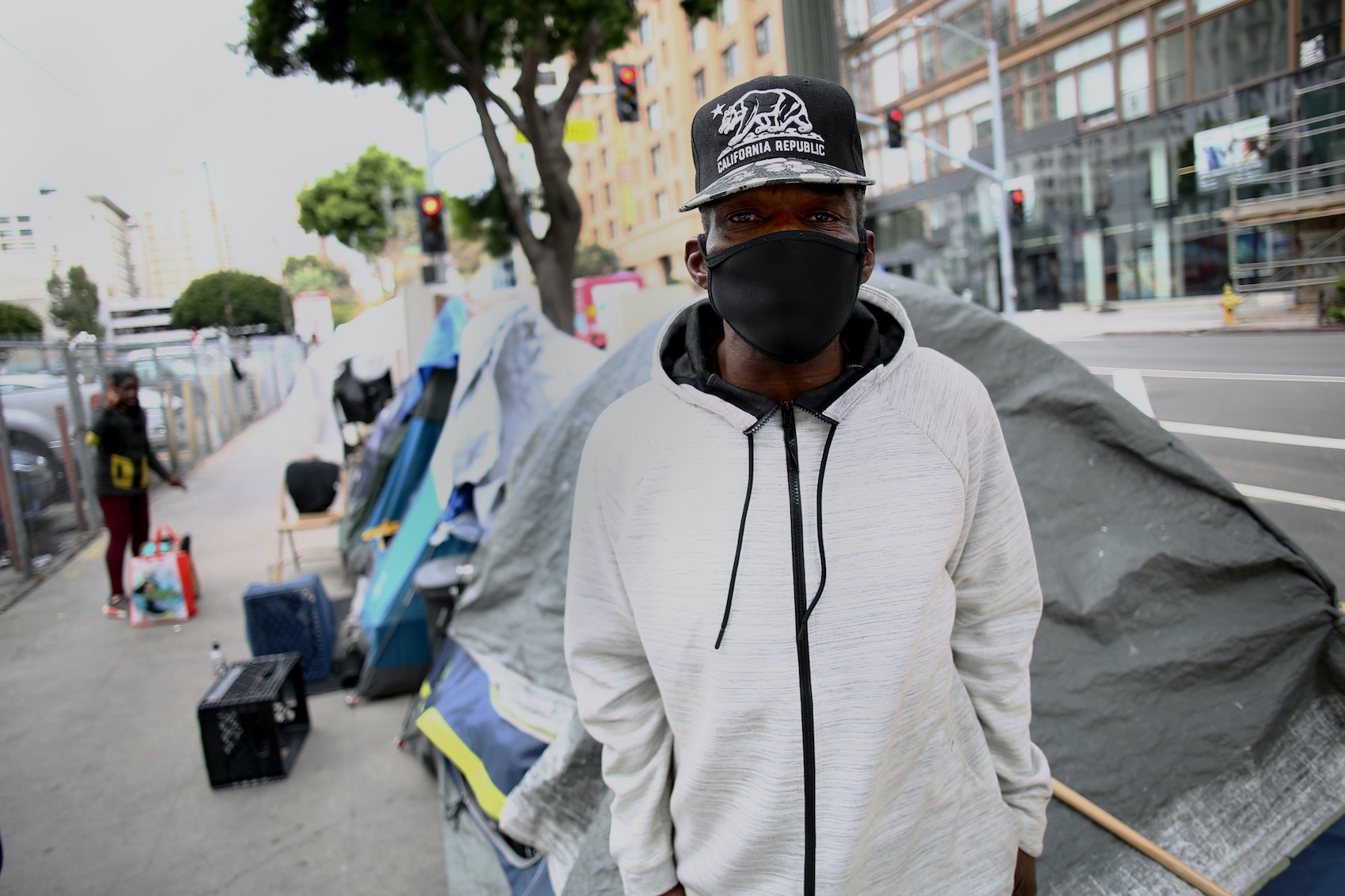Cities Fighting Coronavirus Must Provide Housing For The Homeless
Taking emergency measures to protect homeless people from the pandemic is simply common sense.

This piece is a commentary, part of The Appeal’s collection of opinion and analysis.
The coronavirus pandemic has given a new urgency to America’s homelessness crisis. Because people without homes are fundamentally unable to self-isolate and protect themselves from COVID-19, state and local governments must act immediately to house as many people as possible.
Some elected officials have already begun this process. In California, where about 150,000 homeless people live, Governor Newsom announced “Project Roomkey” on April 3, a partnership with the Federal Emergency Management Agency that will provide 15,000 hotel rooms across the state for homeless people who are at risk of contracting the virus. In March, Newsom issued an executive order authorizing $150 million in emergency homelessness funds to support existing shelter infrastructure and lease hotel rooms. This month, San Francisco city officials are working to set aside 4,500 hotel rooms for homeless residents, and in Los Angeles, “dozens” of hotels are opening their doors.
New York City has followed suit, although not as quickly. As of April 6, the city had set aside about 700 vacant hotel rooms for homeless people with coronavirus symptoms. More than 60,000 homeless people live in New York City, and according to the Department of Social Services, at least 371 homeless people from shelters have already tested positive for the virus, and 23 people have died.
Accordingly, a coalition of advocacy groups circulated an online petition and held a virtual press conference last week calling on the city to immediately offer 30,000 hotel rooms for homeless people and end all law enforcement “sweeps” and “clean-ups” targeting homeless people. Multiple people who live in New York City homeless shelters spoke during the conference, and they alleged that not all shelters have been supplied with hand sanitizer. One man said he had even purchased hand sanitizer out of his own funds and donated it to his shelter, and noted that social distancing is practically impossible in city shelters, where beds are placed just 36 inches apart. “It seems like it’s an environment created for individuals to contract the COVID-19 virus,” he said.
The April 7 press conference was joined by several elected officials in city and state government, including New York City Public Advocate Jumaane Williams. “We have 100,000 hotel rooms,” Williams said. “We are simply asking for 30,000 of those hotel rooms to help ease the congestion in shelters.”
Councilmember Stephen Levin also noted that the city has the ability to procure enough hotel rooms to house 30,000 homeless people. In fact, the city has already leased over 10,000 beds across 20 hotels to expand hospital capacity. “If we don’t have enough hotel rooms, then there are plenty of dorms that are empty right now, whether that’s NYU dorms or Pace dorms or Fordham dorms,” Levin said.
Taking emergency measures to protect homeless people from the pandemic is simply common sense. Without a home, people are unable to safely isolate themselves or practice social distancing, and public health experts have emphasized the need to limit people’s exposure to the virus in order to “flatten the curve” and protect healthcare capacity. In other words, protecting homeless people from the virus is the only way to protect the entire city from the virus.
New York City advocates also called on the city to create permanent housing for homeless people, including “vacant rent-stabilized units, condos, vacant HPD Housing Connect Units, empty NYCHA units, and empty supportive housing units.” The city should follow their advice—and so should every other city with a substantial homeless population. In California, Governor Newsom has pledged to secure permanent housing for homeless people after the COVID-19 crisis subsides, and noted that the state may be able to purchase hotels for that purpose.
There’s no shortage of strong arguments in favor of the government providing housing for people without homes, even outside of pandemics. The simplest argument is a moral one: We’re obligated to prevent as much human death and suffering as possible. Human beings require shelter to survive, and America is one of the wealthiest nations on the planet. We can absolutely afford to support our most underserved neighbors, and therefore we should do so.
Next, the policy angle: Ensuring that all Americans have a place to live will improve their lives, and also improve society more broadly. First, giving people homes will protect public health, and not just during this COVID-19 crisis. Homeless people visit emergency rooms and are hospitalized at much higher rates than the general population, and stable, affordable housing is associated with improved health outcomes. Research also shows that affordable and supportive housing projects can reduce crime and incarceration—in other words, guaranteeing housing will make America healthier and safer.
Finally, the financial case for housing homeless people: Compared to the status quo, it is simply less expensive to give every homeless person permanent housing. In Los Angeles County, Charlotte, and southeastern Colorado, research has demonstrated that giving people homes can lead to substantial cost savings. Additionally, housing people goes hand in hand with ending vicious law enforcement harassment of the homeless, which needlessly expands carceral capacity (and local budgets). In other words, if everyone had a place to live, law enforcement would spend less time making unnecessary arrests and handing out tickets. Shrinking gargantuan police budgets and shuttering jails could also be an efficient cost-cutting measure.
Elected officials must act immediately to ensure temporary and permanent housing for homeless people. Without swift action, the damage inflicted by coronavirus will only grow.
Jonathan Ben-Menachem writes about politics and culture, focusing on policing, austerity, and the criminalization of poverty.
